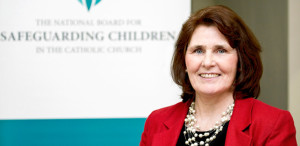
By Sarah Mac Donald - 30 June, 2016

The National Board for the Safeguarding of Children in the Catholic Church in Ireland (NBSCCCI) has launched its new Guidance on Child Safeguarding.
It incorporates two new standards on caring for and managing the complainant of abuse and the respondent.
The 2016 Guidance, which was published on Wednesday, is a substantial update on those originally produced in 2008 according to the NBSCCCI.
“As we carried out our Reviews we saw evidence that confusion over the implementation of the Standards was taking place,” Teresa Devlin, CEO of the NBSCCCI explained.
“Also we noticed areas where new standards would be required. Consequently we now have two new standards. One focuses on care and support for the complainant of abuse and the other on care and management of the subject of allegations of abuse, and a dedicated set of guidance materials has been prepared for each,” she said.
The Church watchdog on safeguarding believes the new standard on caring for and managing the respondent ensures a fair and just process within the Church follows any investigation by the relevant State authorities.
“Since the Standards were originally adopted in 2008 we have seen legal changes that also had to be incorporated into the new Guidance, for example, the establishment of National Vetting Bureau under the National Vetting Bureau (Children and Vulnerable Adults) Act 2012. Additionally the Guidance now has much more advice regarding social media and the internet,” Teresa Devlin pointed out.
Standard Three, which deals with care and support for the complainant, requires Church institutions which receive allegations of abuse to respond compassionately and offer those who have alleged child abuse access to appropriate care, advice and support.
“The Church authority must have in place a safeguarding structure that provides consistent and effective responses to the safeguarding needs of child and adult complainants across the Church as a whole.”
“Complainants need to be listened to and heard to ensure that any allegation or disclosure of abuse is handled compassionately, effectively and professionally.”
Elsewhere the new standard highlights that people who have been abused want to be heard and to have their very real pain acknowledged. They want a compassionate response from the Church and to see action take place to ensure children are now safe.
“A person who has suffered abuse will have significant strengths, as well as potential complex needs.”
“Disclosing abuse takes enormous courage and calls for a high level of trust. Child abuse by its very nature can damage trust; it is therefore imperative that when a complainant is ready to tell their story, the listener responds with great sensitivity and compassion,” the NBSCCCI document states.
“There will be a complex mix of feelings and emotions where abuse has been at the hands of someone the complainant has trusted, and even more so if the respondent holds a position of spiritual or moral responsibility. This may then include the challenging process of re-establishing relations with a faith community and with God.”
The new standard requires that:
– Complainants are met and facilitated to disclose abuse in an environment that meets their individual needs;
– Complainants are heard in a spirit of acceptance and trust;
– Counselling, support and information is given to children and adults who wish to make a complaint of abuse;
– Pastoral care is given to those who have been abused by Church personnel, where this is deemed helpful by the complainant.
Standard Four deals with those who have allegations of child abuse made about them and requires dioceses and religious orders to offer them access to appropriate advice and support.
It stresses that “A proper balance should be struck between protecting children and respecting the rights of respondents. Where there is conflict, the child’s welfare must come first.”
“The rights of respondents are important and are given due weight, once the safety and protection of children has been assured.”
On the role of an Advisor, it highlights that the appointed Advisor:
– Attend the initial meeting with the respondent, the DLP and the Church authority in order to support them;
– Keeping them informed of the progress of their case;
– Direct them to counselling and support as necessary;
– Help the respondent access both civil and canon law advice;
In relation to Standard 4, the advisory panel is responsible for providing advice to the Church authority with regard to:
– The credibility of the complaint;
– The appropriateness of providing help to a respondent or their family;
– The appropriateness of the respondent continuing in their present pastoral assignment, bearing in mind the paramount need to protect children;
– The respondent’s right to due process and their right to the presumption of innocence until a determination is made about the veracity or not of the allegation;
– Whether a specialist risk assessment for the respondent should be sought;
– The needs of a parish or other community in which a respondent has served.
The Guidance on Leave from Sacred Ministry explains that among the actions that may be necessary during both a statutory investigation and a Church inquiry is the restriction of a respondent’s exercise of their office and/or sacred ministry and apostolate.
A respondent may be asked to withdraw from a particular office and from other forms of sacred ministry and apostolate, including public celebration of the Eucharist and other sacraments during the course of any statutory – as well as Church and canonical – investigation.
The respondent may also be required to cease from wearing clerical attire.
It outlines two factors that will determine the Church authority’s action in this regard:
The threshold for reporting to the statutory authorities has been reached;
An initial assessment of the potential risk to children has been conducted.
It states that each case will have to be considered on its own merits. The advice provided to the Church authority should specifically include an assessment of the credibility of the allegation, and the potential risk arising as a consequence.